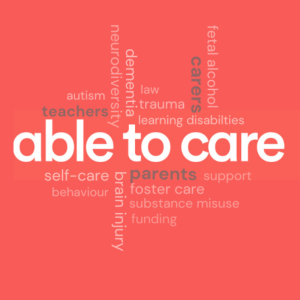
Friday Mar 21, 2025
How to Support Neurodivergent & Trauma-Affected Individuals for Parents, Teachers and Carers
Think about the last time you saw a behavior that stood out to you.
Maybe a child flapping their hands, someone repeating a phrase, or a person refusing to follow an instruction. Did you immediately see that behavior as a problem to be fixed?
For years, behaviorist models have focused on modifying behaviors—rewarding the “good” and discouraging the “bad.” But what if some of the behaviors we try to change are actually essential coping strategies?
In this episode, host Andy Baker explores the difference between adaptive and maladaptive behaviors, why traditional approaches to behavior management can do more harm than good, and how we can shift toward a neurodiverse-affirming, person-centered approach that truly supports those we care for.
🎧 Sponsor: Carers Card UK – Support, Recognition & Rewards
This episode is proudly sponsored by Carers Card UK, the UK’s #1 discount card for unpaid carers.
Started by two best friends who recognized that carers deserve better, Carers Card UK provides:
✅ A recognized ID card for access to discounts & emergency information
✅ A well-being hub and exclusive Carers Circle tool
✅ Savings on gym memberships, days out, clothing, glasses, and more
💙 For less than the price of a box of chocolates a year, you can get the support you deserve.
🎟️ Order yours today using our exclusive promo code at CarersCardUK.com
Key Messages from This Episode:
🧠 Behavior Is Communication – Many so-called “challenging” behaviors are actually adaptive strategies for coping, self-regulating, or communicating unmet needs.
💬 Traditional Behaviorist Approaches Can Be Harmful – Punishing or suppressing behaviors without understanding their function can lead to anxiety, distress, and learned helplessness.
⚖ Compliance Isn’t the Goal—Connection Is – Instead of forcing compliance, we should be supporting autonomy, self-regulation, and emotional well-being.
🌍 We All Have Biases – Some behaviors we try to “correct” (like avoiding eye contact or stimming) aren’t actually harmful—they just don’t fit societal norms.
🔍 Focus on Functional Behavior – Ask “What need is this behavior fulfilling?” instead of “How do I stop it?”.
📌 Key Timestamps:
📌 [00:00] – Introduction: Why our approach to behavior needs to change
📌 [00:20] – Understanding adaptive vs. maladaptive behavior
📌 [00:52] – Sponsor: Carers Card UK – Support & recognition for carers
📌 [02:13] – Why traditional behavior management is outdated
📌 [03:09] – The problem with focusing on behavior modification
📌 [06:22] – Recognizing functional behavior vs. challenging behavior
📌 [10:00] – Why suppression of behaviors can do more harm than good
📌 [12:08] – Supporting autonomy and self-regulation over compliance
📌 [16:49] – Rethinking social norms: What is truly harmful vs. just different?
📌 [17:09] – Final reflections: Understanding before correcting
📲 Connect With Us on Social Media:
🎧 Follow the Able to Care Podcast for more insightful episodes:
📲 Instagram: @AbleToCarePodcast
📲 LinkedIn: @AbleTraining
📲 TikTok: @AbleToCare
📩 Subscribe to our newsletter for resources, expert insights, and upcoming episodes: AbleHub.uk
🎓 Looking for Training in Behavior Support & Neurodiversity?
Able Training offers expert-led courses on behavior management, de-escalation, and trauma-informed care for professionals, carers, and educators.
📞 Contact us today: AbleTraining.co.uk
🚀 Book your course now and enhance your understanding of behavior!
No comments yet. Be the first to say something!